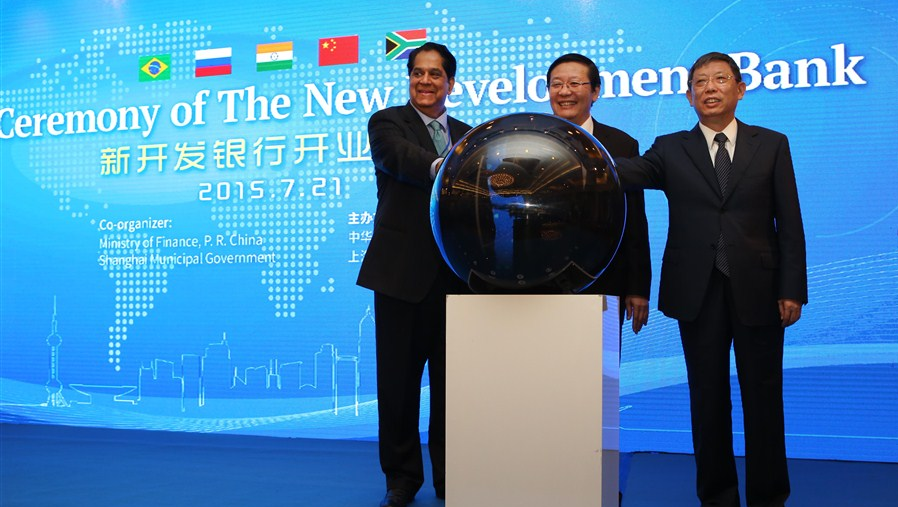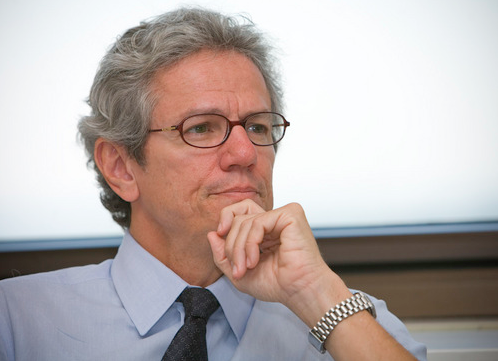
Less than a month after the signing ceremony of the China-led Asian Infrastructure Investment Bank (AIIB) in Beijing, another global financial institution was launched 1200 kilometers further South. Based in Shanghai, China’s financial hub, the New Development Bank’s creation marks a remarkable step in the history of the BRICS grouping. After being a mere investment category between 2001 and 2007 and an informal platform between 2008 and 2014, the launch of the NDB is the beginning of a new era for an unlikely grouping that has been confronted with broad skepticism and rejection in the Western media since the very beginning. Born as a political outfit at the height of the Western financial crisis of 2008, it is no exaggeration to say that the BRICS grouping is, along with the G20, the most important innovation in global governance since the turn of the century. While the Asian Infrastructure Investment Bank has received far more media attention (largely due to the United States’ ill-conceived attempt to keep others from joining it), the NDB will begin with initial capital of $100bn, the same as the AIIB. The five BRICS countries all have equal voting shares.
It is still early to adequately assess how the NDB will influence ties between member countries, development and lending practices (conditionality) and global governance more generally.
With regard to ties between member countries, the creation of the bank — along with the Contingency Reserve Agreement (CRA) is set to strengthen the relationship between central banks, national development banks and finance ministries. Yet the existence of the bank should be used to generate additional ties not only between governments, but between societies, which know very little about each other. There are many ways in which the bank could serve as a platform. For example, the NDB should encourage doctoral students in economics from BRICS countries to spend time at headquarters in Shanghai to conduct research. Whenever the bank’s decision-makers travel to member countries, they should engage with civil society to explain the bank’s activities. Most Brazilians, Russians or Chinese have never heard of the bank, yet a broad public discussion can only benefit the new institution. The Brazilian Vice-President of the Bank, Paulo Nogueira Batista Júnior, is a columnist at Globo, a major Brazilian newspaper and occasionally writes in the international media. His new counterparts at the NDB should do likewise, and regularly participate in discussions at research institutes and universities around the world. In addition, the Bank’s website should be improved as soon as possible and provide detailed information about lending practices, project information and — similar to the World Bank — global economic data. All that could help turn the NDB into far more than a bank: a platform to generate and promote cutting-edge knowledge about development.

Paulo Nogueira Batista, Vice-President of the New Development Bank
The NDB’s impact on lending practices will only become evident in the coming years. As Green and Kalomeris point out,
on the one hand, the bank can be seen as an alternative to the Western-based conditionality of existing institutions. IMF loan conditions are often called excessive or even hypocritical when requirements exceed the actions of the lender at a similar point of development. On the other hand, if it supports projects with controversial environmental, social, or corruption concerns, the NDB is left open to criticism.
Interestingly, Lou Jiwei, China’s Foreign Minister, said at the ceremony
This bank will place greater emphasis on the needs of developing countries, have greater respect for developing countries’ national situation, and more fully embody the values of developing countries. (…) Development is a dynamic process. There’s really no such thing as so-called ‘best practices’.
Mr Kamath pledged to move the bank “from best practices to next practices”, adding that traditional development lending was often “too rigid, inflexible, and slow”.
Irrespective of the NDB’s lending strategy, the new bank is welcome news from a development perspective. The developing world badly needs greater investment in infrastructure, and none of the existing banks have been able to satisfy such a massive demand. In India alone, expenditure needs for infrastructure amount to an estimated $2 trillion in the coming decade. Over the past years, Nicholas Stern, Joseph Stiglitz, Amar Bhattacharya, and Mattia Romani have campaigned globally for the creation of a new BRICS-led bank. As the four economists point out in a 2013 op-ed,
The infrastructure requirements in emerging-market economies and low-income countries are huge — 1.4-billion people still have no reliable electricity, 900-million lack access to clean water and 2.6-billion do not have adequate sanitation. About 2-billion people will move to cities in the next 25 years. Policy makers must ensure the investments are environmentally sustainable. To meet these and the other challenges, infrastructure spending will have to rise from about $800bn to at least $ 2-trillion a year in the coming decades or it will be impossible to achieve long-term poverty reduction and inclusive growth.
The NDB’s impact on global governance remains perhaps the most interesting question, even though it will take years before we gain a clearer understanding of whether and how it will affect existing structures.
Many observers see the bank as proof that the BRICS have a revisionist agenda. Varun Sahni, for example, argues that the establishment of the NDB is “a strong example of revisionist power aggregation, insofar as it challenges the structures and legitimacy of the World Bank and the International Monetary Fund.” Others point out that the bank is a natural reaction by emerging powers to an order that has been unwilling or unable to include them adequately. NDB president Kamath insists that “our objective is not to challenge the existing system as it is but to improve and complement the system in our own way.” Even though the bank’s website states the NDB is “operated (…) as an alternative to the existing U.S.-dominated World Bank and International Monetary Fund”, calling the BRICS countries revisionist would be misguided. Quite to the contrary, the NDB’s launch underlines the BRICS’ willingness to help fix a system that no longer satisfies existing demands. Only those who regard US leadership, rather than the system’s rules and functionality, as the decisive element of today’s order will call the BRICS revisionist.
As Daniel Chardell correctly writes,
(…) the NDB and CRA mark the BRICS’ response to the widely acknowledged shortcomings of the existing global financial system. A common desire to reform global economic governance was the issue that drove the BRICS together and gave them legitimacy in the aftermath of the global financial crisis. For years, the BRICS have demanded an overhaul of the Bretton Woods institutions, where Western powers remain overrepresented at the expense of emerging economies. China, the world’s second-largest economy, has just 3.81 percent of total votes in the International Monetary Fund (IMF). To put that in perspective, France and the United Kingdom each have 4.29 percent, yet their economies are three times smaller than China’s, according to the latest IMF data. Clearly, some reshuffling is long overdue.
The launch of the NDB is a huge success for the BRICS grouping, but the grouping’s greatest challenges lie ahead. Creating a globally active development bank is fiendishly difficult, and the BRICS will be wise to draw from existing institutions’ experiences. In a sign of welcome pragmatism by member countries, the bank’s key decision-makers, such as Kamath (private banking) and Nogueira Batista (IMF), possess expertise from established bodies.
While the new institutions must first show that they can make a tangible contribution to addressing international development challenges, the NDB — along with the AIIB — may serve as symbols of a very different global institutional landscape: more complex, less Western-centric, but ultimately more adequate for a multipolar world.
Read also:
As Brazil’s Senate approves creation of BRICS Bank, grouping enhances parliamentary cooperation
China Development Bank: A model for the BRICS Bank?
Why Washington struggles to understand the BRICS
Photo credit: Shanghai Daily/Wang Rongjiang








